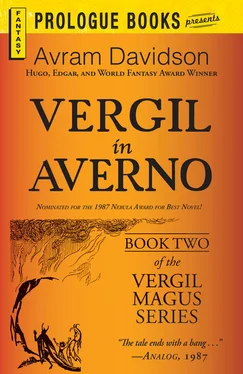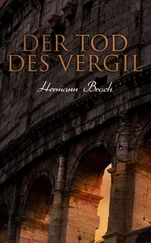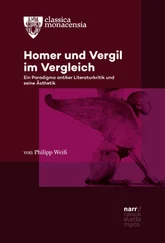Avram Davidson - Vergil in Averno
Здесь есть возможность читать онлайн «Avram Davidson - Vergil in Averno» весь текст электронной книги совершенно бесплатно (целиком полную версию без сокращений). В некоторых случаях можно слушать аудио, скачать через торрент в формате fb2 и присутствует краткое содержание. Жанр: Фэнтези, на английском языке. Описание произведения, (предисловие) а так же отзывы посетителей доступны на портале библиотеки ЛибКат.
- Название:Vergil in Averno
- Автор:
- Жанр:
- Год:неизвестен
- ISBN:нет данных
- Рейтинг книги:3 / 5. Голосов: 1
-
Избранное:Добавить в избранное
- Отзывы:
-
Ваша оценка:
- 60
- 1
- 2
- 3
- 4
- 5
Vergil in Averno: краткое содержание, описание и аннотация
Предлагаем к чтению аннотацию, описание, краткое содержание или предисловие (зависит от того, что написал сам автор книги «Vergil in Averno»). Если вы не нашли необходимую информацию о книге — напишите в комментариях, мы постараемся отыскать её.
Vergil in Averno — читать онлайн бесплатно полную книгу (весь текст) целиком
Ниже представлен текст книги, разбитый по страницам. Система сохранения места последней прочитанной страницы, позволяет с удобством читать онлайн бесплатно книгу «Vergil in Averno», без необходимости каждый раз заново искать на чём Вы остановились. Поставьте закладку, и сможете в любой момент перейти на страницу, на которой закончили чтение.
Интервал:
Закладка:
Often.
To be sure there were places, manywhere, whither flame and fire came not and whither firewood or charcoal was brought, places where the bellows plied and puffed; if the city were one vast hot spring or fumarole or one immense blacksmith-fire, there would have been no place, no inch nor ell, for the foot of man or woman safely to tread. But it was the presence of the other places — there, below, in that smoky bowl below, the places where flames either broke the sullen surface of the soil or lay so close thereto that the soil itself steamed and smoked — this was the reason for the existence of Averno as a city. Endlessly, no doubt, before the appearance of man thereby, these phenomena had been displayed therein: uselessly, as it were; wastefully, as it seemed. But now in all this valley-bowl “the arts of fire and metal” might be practiced without much real need to bring much fuel for fire. The artisans of Averno were not better artisans than those elsewhere, indeed, often, they were not as good; few swords or shares or scythes or axes or other tools of iron were made there: but many and many were the such-shaped blanks of iron formed to be exported, elsewhere to be sharpened for keen use. And these were invariably cheaper than those exported from elsewhere. The dyed garments of Averno were not so brightly colored, so fastly, nor so subtly as those of Tyre; not even as well done as those of Naples. But, though coarser, they were cheaper. Coarse metal, coarse cloth, coarse leather, coarse wool, these were the products of Averno. Or, reading from the other end of the line: cheap wool, cheap leather, cheap cloth, cheap metal. Had there been birds in Averno — which, save here and there a one or two or few sickening in cages, there were not; the very hens and cocks and capons were slaughtered on arrival — but had there been birds in Averno, this might have been their song: cheap-cheap, cheap-cheap, cheap-cheap.
The slow destruction and retreat of the forests of the Empire (indeed, of the whole oeconomia), with the resultant slow rise in the prices of firewood and charcoal, might work ill with the commerce of the arts of fire and metal elsewhere, but in Averno where one, so to speak, lived ill anyway, this was a blessing, a blessing and not a curse. A blessing, that is, for the magnates of Averno. They needed no skill in sales, were obliged to transport their wares to no distant shores, nor offer discounts nor sell on credit nor break themselves on racks to deal with competitors. Where they worked, there they sold. Others came to them, or did not come at all.
The magnates of Averno did not care.
They were cheap, cheap, cheap.
And so of course they had become rich, rich, rich.
Averno took no toll on private bag and baggage coming in, and it had long ago secured (and maintained) an exemption from the Imperial Imposts usually, elsewhere, levied (and collected) at city gates. . another reason for its being Very Rich. As Vergil wore no sword, there was no discussion over that; as for knives, every man, everywhere, carried at least one knife: how else would he cut his food?
“Write the book,” directed the gateskeeper, with a bored belch. He had already sized up Vergil as one who could do his own writing and so the services of a scribe were not required and there would be no fee to split. Vergil signed for himself and servant. The titles, in their abbreviations, did not impress the custos, nor would they have if indited in full; the man did not read. “Where you go?” he asked. He did not really care, but he had his reasons for asking.
Two of them.
The deeper shadow of the Great Gate encompassed them; shadow always lay deep on part of Averno. Set so deep as it was, the sun coming late and departing early, it was more shadowy there in the Great Gate, and pho! how it stank. “The house of Haddadius the dye-master,” said Vergil. The keeper looked at him and looked past him and held up two fingers. A trace of a grimace lifted one corner of his great grim mouth; the ghost of a rictus; hardly even that, of a smile. And he clicked his mouth, twice.
“Two birdies,” he said. The tiny coins being produced, he stuffed one into the purse deep in his grimy bosom, sent another one spinning across the tunnel-mouth of the gateway. It rang against the dripping wall, fell on the wet ground where a number of figures crouched. Most of them raised their heads, but only one. . the nearest. . raised his body. He got to his feet, after he had picked up the miserable money-bit, came over in a shuffle and a shudder. The gatesman said, “Addadi.” The man gave neither beckon nor nod, started off in a lurching stumble and stagger, pausing and doubling over in a cough that seemed to churn his lungs and cripple his limbs. As Vergil, and Iohan holding the mare, started to follow, the keeper called to the shambling guide, “An when y’pass the bones-pit, drop in. — You, too,” he added, to man and manservant. Hawked and spat. Returned to his stand.
Such was charity in Averno.
And welcome, as well.
Would Haddadius the dye-master be more welcoming? Vergil considered, as they passed through the filthy streets, as different from the cleanly thoroughfares of the small port town as the glowing sunsets there were from this filthy dusk, if it might not be better to seek an inn first. But some thought that Haddadius, having in effect sent for him by such devious ways, might have something else in mind for his accommodations, kept him from doing so. And so he followed after the lurching wreck of what had once been a fine large man; and when this one paused and leaned against a wall, though Vergil thought it was from weakness, on coming along up he saw there was a gate set into the wall. And on this the guide placed his hand. He did not even knock. He patted it once. He stroked it, once. Then he merely stayed there. And looked at Vergil from running, sunken eyes. Even when the man took the coin, and a bigger one it was than a “birdy,” Vergil was not sure if he was nodding thanks, or if it was merely the trembling movements of his diseased condition. By and by, he was gone.
If Haddadius had something at all in mind for Vergil’s accommodations it was not evident, nor was anything else that might have been on Haddadius’s mind. The magnate was hardly more welcoming than the gateskeeper, but he did not engage in open insult, possibly because this might have required him to rise from his bath, where Vergil found him after having been (dilatorily, sullenly) led thither by a slave with a cast in one eye. Massive, mute, and shaggy, Haddadius listened in silence to Vergil’s polite words. Though the words were polite, yet Vergil felt they were mere forms, for he did not care to state exactly his reasons for having come to Averno; surely they must be and had been known? If so, Haddadius gave no sign of it. What Haddadius gave, eventually, was a grunt, and the sign which he next gave was to a secretary who appeared so suddenly from the shadows that one less disciplined than Vergil might have started; to himself he said that shadows seemed appropriate to a secretary, by definition, even, the one who kept the secret things. The magnate muttered, the scribe scribbled, the mutter ceased.
The secretary handed over the set of tablets on whose wax-inlaid inner surfaces he had made his notations. They were well-made tablets, of precious wood and inset in mother-of-pearl with a rather beautiful picture of Ganymede bearing the cup. Where had this been crafted? Not in Averno. How came it there? Avernians were not known to fancy beauty. He opened the small wooden sheets; inside, on the scented wax (did it serve to refresh the sense of smell, in Averno so much-abused?) were written a number of names.
“One of these may have use for you,” was what the secretary said. And that was all the secretary said. Was it for merely this that Vergil had come here? — Had so (he thought) smoothly and with polite intimation made mention of the fact that “from Sevilla to Averno was a rather far journey and that many things have been learned on such journeys”? And. . for that matter. . was it for such curt congees, dismissals, even from an audience consisting of a barbarian in a bath, that he had himself made those long journeys? From Brundusium to Athens, Athens to Brundusium, Brundusium to Naples, Naples to this place, to that place and thence to Sevilla, and so, eventually here? In Averno? No, but then, for what purpose had he made them? In order to attain mastery over many things, and the first of these had been his own self and soul and pride and patience; and over them, well. And then, too, to what purpose all those dreams? Things were seldom simple; this was no exception.
Читать дальшеИнтервал:
Закладка:
Похожие книги на «Vergil in Averno»
Представляем Вашему вниманию похожие книги на «Vergil in Averno» списком для выбора. Мы отобрали схожую по названию и смыслу литературу в надежде предоставить читателям больше вариантов отыскать новые, интересные, ещё непрочитанные произведения.
Обсуждение, отзывы о книге «Vergil in Averno» и просто собственные мнения читателей. Оставьте ваши комментарии, напишите, что Вы думаете о произведении, его смысле или главных героях. Укажите что конкретно понравилось, а что нет, и почему Вы так считаете.












